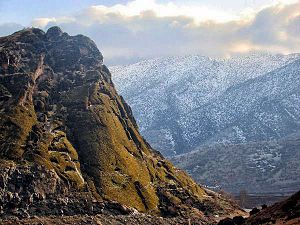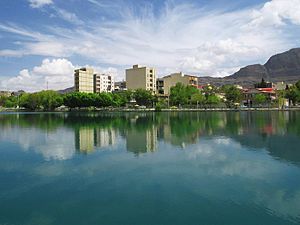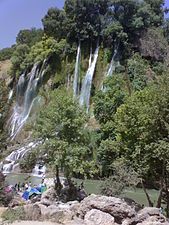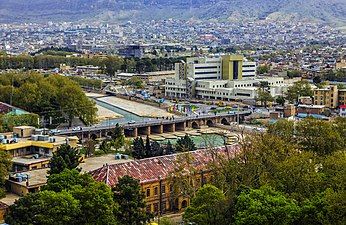Khorramabad
Khorramabad
Persian: خرمآباد | |
|---|---|
City | |
 Montage of Khorramabad, Clockwise:Falak-ol-Aflak Castle, Keeyow lake, Shapuri bridge, View of the Khorramabad city, Brick Minaret, Panorama of Khorramabad | |
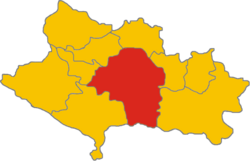 The territory of the Khorramabad inside the province of Lorestan | |
| Coordinates: 33°29′15″N 48°21′22″E / 33.48750°N 48.35611°E[1] | |
| Country | Iran |
| Province | Lorestan |
| County | Khorramabad |
| District | Central |
| Government | |
| • Mayor | Daryush Barani Beyranvand[2] |
| Elevation | 1,147 m (3,763 ft) |
| Population (2016)[3] | |
• Total | 373,416 |
| Time zone | UTC+3:30 (IRST) |
| Climate | Csa |
| Website | www.Khorramabad.ir |
Khorramabad (Persian: خرمآباد; [xoræmɒːˈbɒːd] ⓘ)[a] is a city in the Central District of Khorramabad County, Lorestan province, Iran, serving as capital of the province, the county, and the district.[5] Khorramabad is close to the border with Iraq. Situated in a scenic valley surrounded by mountains, the city lies approximately 100 kilometers (about 62 miles) east of the Iraqi border.[6][7][8]
History
[edit]Hazaraspids
[edit]The founder of the Hazaraspid dynasty was Abu Tahir ibn Muhammad, a descendant of the Shabankara chieftain Fadluya. Fadluya was initially a commander of the Salghurids of Fars and was appointed governor of Kuhgiluya,[9] but eventually gained independence in Luristan and extended his realm as far as Isfahan.
Safavid dynasty
[edit]During the reign of the Safavid dynasty, Khorramabad was the administrative center of Luristan Province.
In the wake of the demise of the Safavids, after the signing of the Treaty of Constantinople (1724) with Imperial Russia, the Ottomans conquered Khorramabad on the 6th of September 1725.[10]
Demographics
[edit]Language
[edit]The city population is predominantly Lur and the largest Luri-speaking city in the country.[11][12]
See below, the linguistic composition of the city:[13]
Population
[edit]At the time of the 2006 National Census, the city's population was 328,544 in 75,945 households.[14] The following census in 2011 counted 348,216 people in 94,747 households.[15] The 2016 census measured the population of the city as 373,416 people in 109,231 households.[3]
Geography
[edit]Location
[edit]Khorramabad is in the Zagros Mountains. Khorramabad Airport is 3 km south of the city proper.[16]
Climate
[edit]Khorramabad has mild and semi-humid Mediterranean climate with high amount of rainfall during spring and winter. It is the sixth cities in Iran having high level of annual rainfall.
Khorramabad has what is classed under the Köppen climate classification as a Hot-summer Mediterranean climate (Csa) climate. Its elevation is 1147.8 above sea level. Average annual precipitation is 511.06 and its average annual temperature is 17.21 Celsius.
Highest recorded temperature: 47.0 °C (116.6 °F) on 14 August 1960 and 23 July 1961[17]
Lowest recorded temperature: −14.6 °C (5.7 °F) on 25 January 1990.[18]
| Climate data for Khorramabad (1991–2020, extremes 1951-2020) | |||||||||||||
|---|---|---|---|---|---|---|---|---|---|---|---|---|---|
| Month | Jan | Feb | Mar | Apr | May | Jun | Jul | Aug | Sep | Oct | Nov | Dec | Year |
| Record high °C (°F) | 24.0 (75.2) |
26.0 (78.8) |
31.0 (87.8) |
37.0 (98.6) |
41.0 (105.8) |
45.0 (113.0) |
47.0 (116.6) |
47.0 (116.6) |
43.0 (109.4) |
37.0 (98.6) |
34.0 (93.2) |
25.6 (78.1) |
47.0 (116.6) |
| Mean daily maximum °C (°F) | 11.0 (51.8) |
13.3 (55.9) |
17.6 (63.7) |
22.7 (72.9) |
29.2 (84.6) |
36.3 (97.3) |
39.8 (103.6) |
39.6 (103.3) |
34.9 (94.8) |
27.7 (81.9) |
18.5 (65.3) |
13.0 (55.4) |
25.3 (77.5) |
| Daily mean °C (°F) | 4.5 (40.1) |
6.5 (43.7) |
10.4 (50.7) |
15.0 (59.0) |
20.7 (69.3) |
26.9 (80.4) |
30.4 (86.7) |
29.8 (85.6) |
24.8 (76.6) |
18.5 (65.3) |
10.8 (51.4) |
6.3 (43.3) |
17.1 (62.7) |
| Mean daily minimum °C (°F) | −0.9 (30.4) |
0.6 (33.1) |
3.6 (38.5) |
7.5 (45.5) |
11.5 (52.7) |
15.7 (60.3) |
19.6 (67.3) |
18.9 (66.0) |
14.0 (57.2) |
9.8 (49.6) |
4.4 (39.9) |
0.8 (33.4) |
8.8 (47.8) |
| Record low °C (°F) | −14.6 (5.7) |
−11.5 (11.3) |
−11.0 (12.2) |
−7.0 (19.4) |
−1.8 (28.8) |
7.0 (44.6) |
9.2 (48.6) |
8.0 (46.4) |
4.6 (40.3) |
−1.4 (29.5) |
−7.8 (18.0) |
−12.0 (10.4) |
−14.6 (5.7) |
| Average precipitation mm (inches) | 70.3 (2.77) |
67.8 (2.67) |
84.1 (3.31) |
74.7 (2.94) |
21.6 (0.85) |
1.4 (0.06) |
0.3 (0.01) |
0.2 (0.01) |
1.3 (0.05) |
29.3 (1.15) |
62.9 (2.48) |
79.1 (3.11) |
493 (19.41) |
| Average precipitation days (≥ 1.0 mm) | 7.4 | 7 | 7.5 | 7.4 | 3.4 | 0.3 | 0.1 | 0 | 0.2 | 3 | 6 | 7 | 49.3 |
| Average rainy days | 10.9 | 9.9 | 11.9 | 11.3 | 5.2 | 0.4 | 0.2 | 0.1 | 0.3 | 4.5 | 9.5 | 10.7 | 74.9 |
| Average snowy days | 2.6 | 1.5 | 0.7 | 0 | 0 | 0 | 0 | 0 | 0 | 0 | 0.1 | 0.9 | 5.8 |
| Average relative humidity (%) | 68 | 62 | 56 | 56 | 43 | 24 | 21 | 20 | 23 | 37 | 60 | 68 | 44.8 |
| Average dew point °C (°F) | −1.5 (29.3) |
−1.3 (29.7) |
0.5 (32.9) |
4.8 (40.6) |
5.1 (41.2) |
2.2 (36.0) |
3.4 (38.1) |
2.8 (37.0) |
0.3 (32.5) |
1.2 (34.2) |
2.0 (35.6) |
0.0 (32.0) |
1.6 (34.9) |
| Mean monthly sunshine hours | 174 | 181 | 213 | 230 | 286 | 346 | 344 | 343 | 309 | 260 | 197 | 170 | 3,053 |
| Source 1: NCEI[19] | |||||||||||||
| Source 2: [1] (records, snow/sleet days 1955-2010) | |||||||||||||
Historical monuments
[edit]
Brick minaret
[edit]Brick Minaret is a cylindrical brick tower from Seljuq and Buyid dynasties located inside the ancient city of Shapur khast, south of Khorramabad.
This Iranian minaret is a combination of the Indian Stupa, commemorative columns, and the central Asia tradition of tower building for defensive and communication purposes.[20]
Shapoori Bridge dates back to the Sassanid era and is registered on the list of National Monuments.
Attractions
[edit]Khorramabad is a major tourist destination, it is quite scenic and possesses several attractions, such as five Paleolithic cave-dwelling sites.[21]
Colleges and universities
[edit]
- Islamic Azad University of Khorram Abad
- Lorestan University[22]
- Lorestan University of Medical Sciences[23]
- Madanni Technical College[24]
Sister cities and twin towns
[edit]| Country | City | State / Province / Region / Governorate | Date | ||||
|---|---|---|---|---|---|---|---|
| Turkey | Afyonkarahisar | Afyonkarahisar Province | 2015[25] | ||||
| Japan | Yamagata | Yamagata Prefecture | October 2013[26] | December 2020[27] | |||
Photo gallery
[edit]-
Nojian oak forest, Khorramabad County
-
Makhmalkuh Khorramabad County
-
Keeyow lake, Khorramabad
-
Sarbazkhane building
-
Building in Khorramabad
-
Bisheh waterfall, Khorramabad County
-
Khorramabad
See also
[edit]![]() Media related to Khorramabad at Wikimedia Commons
Media related to Khorramabad at Wikimedia Commons
Notes
[edit]References
[edit]- ^ OpenStreetMap contributors (2 January 2025). "Khorramabad, Khorramabad County" (Map). OpenStreetMap (in Persian). Retrieved 2 January 2025.
- ^ Rashidi, Vahid. "Profile of the Mayor of Khorramabad". khorramabad.ir (in Persian). Archived from the original on 23 July 2020. Retrieved 2 January 2025 – via Khorramabad Municipality.
- ^ a b Census of the Islamic Republic of Iran, 1395 (2016): Lorestan Province. amar.org.ir (Report) (in Persian). The Statistical Center of Iran. Archived from the original (Excel) on 12 October 2020. Retrieved 19 December 2022.
- ^ Khorramabad can be found at GEOnet Names Server, at this link, by opening the Advanced Search box, entering "-3071194" in the "Unique Feature Id" form, and clicking on "Search Database".
- ^ Approval of the organization and chain of citizenship of the elements and units of the country divisions of Lorestan province, centered in the city of Khorramabad. lamtakam.com (Report) (in Persian). Ministry of the Interior, Political and Defense Commission of the Government Board. c. 2024 [Approved 21 June 1369]. Proposal 3233.1.5.53; Letter 907-93808; Notification 82816/T121K. Archived from the original on 19 January 2024. Retrieved 19 January 2024 – via Lam ta Kam.
- ^ https://www.britannica.com/place/Khorramabad
- ^ https://arablit.org/2021/01/28/born-on-the-wrong-side-of-the-border/
- ^ https://www.meed.com/norways-dno-to-study-irans-changuleh-oilfield/
- ^ B. Spuller,Atabakan-e Lorestan[permanent dead link], Encyclopædia Iranica.
- ^ Somel, Selcuk Aksin (2003). Historical Dictionary of the Ottoman Empire. Scarecrow Press. p. xlvi. ISBN 978-0810866065.
- ^ Anonby, Erik John "Update on Luri: How many languages" Archived 2015-05-01 at the Wayback Machine JRAS (Journal of the Royal Asiatic Society) Series 3 13(2): pp. 171–197, p.183, doi:10.1017/S1356186303003067
- ^ "Khorramabad is the largest city of Lurs" (in Persian). Yafte news agancy. 18 April 2018. Retrieved 22 April 2021.
- ^ "Language distribution: individual languages and language families". Iran Atlas. Retrieved 15 September 2023.
- ^ Census of the Islamic Republic of Iran, 1385 (2006): Lorestan Province. amar.org.ir (Report) (in Persian). The Statistical Center of Iran. Archived from the original (Excel) on 20 September 2011. Retrieved 25 September 2022.
- ^ Census of the Islamic Republic of Iran, 1390 (2011): Lorestan Province. irandataportal.syr.edu (Report) (in Persian). The Statistical Center of Iran. Archived from the original (Excel) on 19 January 2023. Retrieved 19 December 2022 – via Iran Data Portal, Syracuse University.
- ^ "Lorestan Province" (in Persian). Lorestan council of dispute resolution. Retrieved 22 April 2021.[permanent dead link]
- ^ "Form 7: Temperature records highest in C. Station: Khorramabad(40782)". chaharmahalmet. IRIMO. Archived from the original on 10 September 2014. Retrieved 25 March 2024.
- ^ "Form 6: Temperature records lowest in C. Station: Khorramabad(40782)". chaharmahalmet. IRIMO. Archived from the original on 14 September 2014. Retrieved 25 March 2024.
- ^ "World Meteorological Organization Climate Normals for 1991-2020: Khorramabad" (CSV). ncei.noaa.gov. NOAA. Retrieved 25 March 2024.
Parameter 71: No. of days with rain/drizzle, Parameter 46:No. of days with rain showers
- ^ Hutt, Anthony Max. (1974). The development of the Minaret in Iran under the Saljügs. A thesis presented for the degree of M. Phil. at London University. OCLC 46455166.
- ^ Baumler, Mark F. and Speth, John D. (1993) "A Middle Paleolithic Assemblage from Kunji Cave, Iran" pp. 1–74 In Olszewski, Deborah and Dibble, Harold Lewis (editors) (1993) The Paleolithic prehistory of the Zagros-Taurus The University Museum of Archaeology and Anthropology, University of Pennsylvania, Philadelphia, Pennsylvania, ISBN 978-0-924171-24-6
- ^ Lorestan University" homepage, in English Archived September 20, 2010, at the Wayback Machine
- ^ "Lorestan University of Medical Sciences homepage". Lums.ac.ir. Retrieved 12 September 2012.
- ^ "afpkh.ir". afpkh.ir. Archived from the original on 11 September 2012. Retrieved 12 September 2012.
- ^ "خطا | خبرگزاری فارس". Archived from the original on 2 April 2015. Retrieved 2 March 2015.
- ^ "راهنمای ثبت شرکت در خرم آباد". www.Sabt-ag.ir.
- ^ "Shahin Souri". www.shahin-soori.ir.
External links
[edit]- Khorramabad municipality Archived 2015-03-14 at the Wayback Machine
- Chisholm, Hugh, ed. (1911). . Encyclopædia Britannica. Vol. 15 (11th ed.). Cambridge University Press. p. 780.




